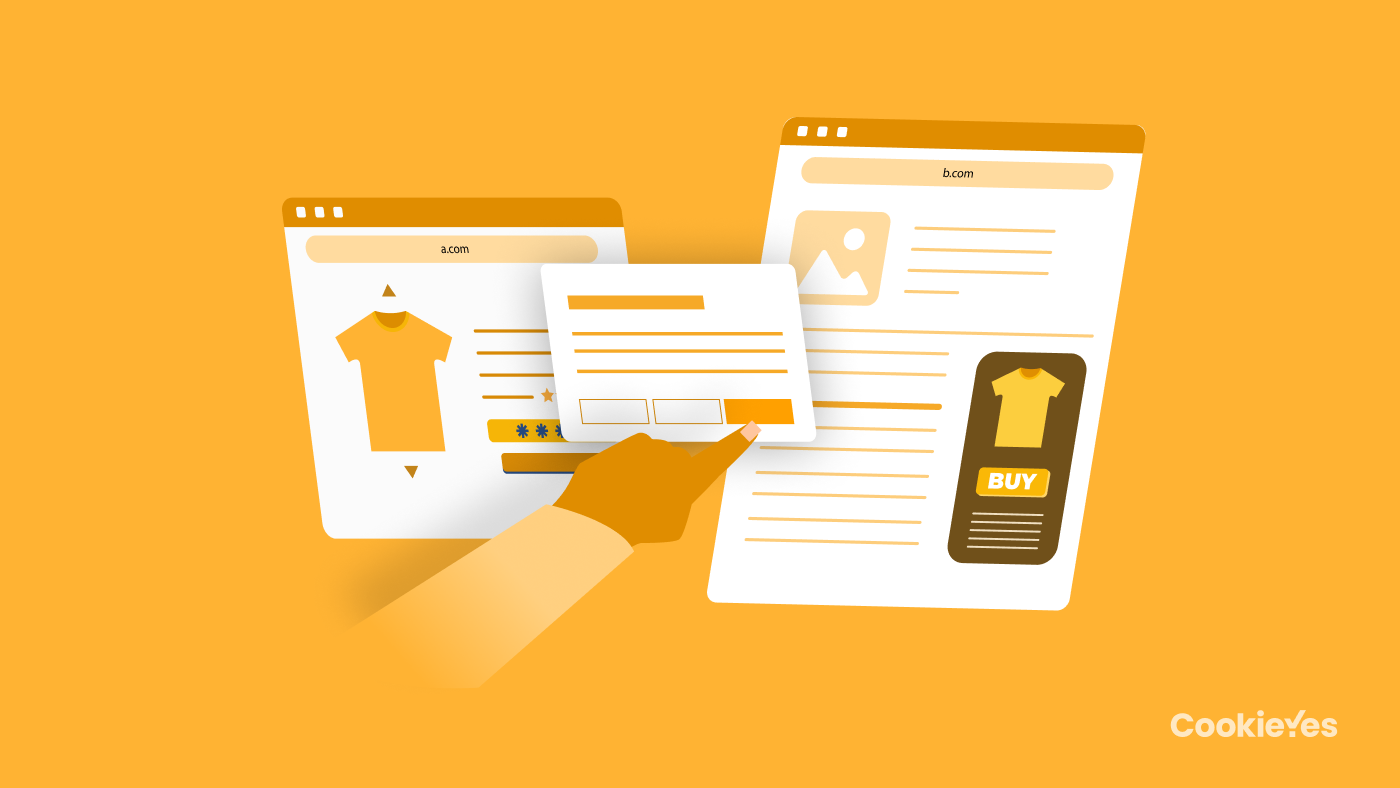Browse, select, and buy – all of this is now done in just minutes. E-commerce websites have revolutionized the shopping experience, forever changing the game. By enabling people to purchase their favorite products from anywhere in the world, right from the palm of their hands, online shops have emerged as the undisputed rulers, surpassing traditional brick-and-mortar stores. But it comes with challenges. With the rising concern over everyday news on data misuse and mishandling, data privacy has become a pivotal topic. Not long ago, the e-commerce giant, Amazon was fined for violating cookie consent rules. Without the right tools and practices in place, your online store may also find itself in legal hot water.
In this comprehensive guide, we will delve into the significance of cookie consent for online stores, shed light on the potential consequences of non-compliance, and provide best practices for cookie banner implementation.
Skip to best practices for e-commerce cookie consent banner
What is cookie consent?
To define, cookie consent refers to the practice of obtaining explicit permission from website visitors before collecting or tracking their personal information through the use of cookies. It ensures that individuals have control over their data and promotes transparency in how websites collect and utilize their information. By complying with cookie consent regulations, websites demonstrate their commitment to privacy and data protection.
Cookies play a vital role in feature-rich websites, but their significance is not without challenges. Once considered harmless, cookies now face scrutiny due to their potential for tracking and invading users’ online privacy. To address these concerns, privacy regulators have implemented strict rules, including the ePrivacy Directive (commonly known as “the cookie law”) and the General Data Protection Regulation (GDPR). As a result, the infamous “cookie consent” emerged, requiring websites to seek explicit consent before collecting or tracking personal information. Cookies are integral to fulfilling this requirement as they rely on user data for their functionalities. Today, cookie consent has become a crucial necessity for websites to safely navigate the digital landscape.
Additional reading on cookie consent: GDPR cookie consent
Why do e-commerce websites need cookies?
There are several reasons why an e-commerce website uses cookies, they include:
- User authentication: Cookies authenticate users on e-commerce sites by remembering login credentials. Users can move between pages, make purchases, or access account info without constantly logging in.
- Session tracking: Session cookies help track user sessions, allowing the site to remember the user’s selections and actions.
- Shopping cart functionality: Cookies can maintain items in online shopping carts. When a user adds items to their cart and continues browsing or leaves the site, cookies store the cart information so that the website can retrieve them when the user returns later. This allows users to resume their shopping where they left off.
- Personalization: Cookies store user preferences and personalize the shopping experience. For example, cookies are used to remember a user’s language preference, display settings, or previously browsed products. This information can be used to provide customized recommendations, display targeted content, and enhance the overall user experience.
- Tracking and analytics: e-commerce sites utilize cookies to gather data about user behavior and interactions. These cookies can track which products a user views, what they add to their cart and their purchase history. This information is valuable for analyzing patterns, understanding customer preferences, and optimizing marketing strategies.
- Advertising and remarketing: Cookies play a crucial role in online advertising. E-commerce sites use cookies to collect information about users’ browsing activities and interests. This data enables targeted advertising campaigns and allows sites to show relevant ads related to similar products to users based on their interactions with the site.
- Site performance: Cookies can be utilized to ensure balanced site performance and prevent server overload. Cookies can maintain session information and direct subsequent client requests to the appropriate server.
- Fraud prevention and security: Cookies can monitor user behavior patterns and detect suspicious activities, such as failed login attempts or fraudulent transactions.
- Third-party integrations: e-commerce sites may integrate with third-party services, such as payment gateways or social media platforms. Cookies can facilitate communication between these services and the site.
Cookie consent is necessary for e-commerce due to several reasons:
- Legal requirements: Many countries have enacted laws and regulations to protect the privacy of online users, such as the GDPR in the European Union and the California Privacy Rights Act (CPRA) in the United States. These regulations require websites to obtain user consent before storing or accessing cookies on their devices. Failure to comply with these laws can result in legal consequences, including cookie consent fines and legal actions.
- Transparency: Cookie consent ensures transparency by informing users about the types of cookies used on a website, their purposes, and the data collected. This transparency empowers users to make informed decisions about their online privacy and allows them to control their preferences. By providing clear information and options for cookie consent, e-commerce websites promote transparency and give users greater control over their data.
- Customer trust: Obtaining cookie consent demonstrates a commitment to user privacy and builds trust with customers. A website that respects users’ privacy rights and seeks their consent for using cookies is more likely to make users feel confident in sharing their personal information.
- Better customer insights: With cookie consent, you gain insights from customers who are familiar with your site’s offerings and are aware of how you use their data. This results in improved analytics, which can assist you in enhancing user experience and optimizing site performance.
In conclusion, you can say, it just is the right thing to do.
Best practices for cookie consent banner for e-commerce
Implementing a cookie consent banner in a user-friendly and compliant manner is essential for your online store. Here are some best practices to consider:
Clear and transparent information
One of the main objectives of laws like GDPR is to promote transparency. They want businesses to honestly disclose what data they collect and how they use it, including cookies. E-commerce sites, which require user data for their operations, must provide easily accessible and concise information about the purpose and types of cookies used, as well as their benefits to users. It is important to clearly communicate the implications of accepting or declining cookies using plain language that users can easily understand.
Granular consent options
Give users the option to selectively consent to various types of cookies on the cookie banner, including functional, analytical, marketing, and other third-party cookies. Your website must offer clear explanations for each cookie category to assist users in making informed choices and customizing their consent preferences according to the cookie categories.
The consent settings can be part of the cookie banner itself or it can be a separate page where users can select their preferred options.
Anytime opt-out choice
Like opt-in consent, the users should have the ability to easily and conveniently reject or withdraw their consent for cookies at any time. By offering a clear and accessible opt-out option, e-commerce websites can respect user preferences and empower individuals to manage their own privacy settings.
Clear and straightforward design
The use of deceptive designs is heavily discouraged by privacy laws as they violate the rule of “free choice” advocated by them. Therefore, your cookie banner should not use deceptive patterns to trick users into giving opt-in consent to use cookies. Make sure that the opt-in and opt-out options are clearly presented and easily accessible, and that the banner doesn’t obstruct the website content in a way that makes it impossible to access them without opting in.
Detailed cookie policy
Merely adding a few details on cookies and their purpose may not be enough. You must provide a detailed account of the cookies the site uses and what they do. For this, a cookie policy (or a privacy policy) page is the best option. From your cookie banner, link to a comprehensive cookie policy that provides detailed information about the cookies used, their purpose, lifespan, and any third-party involvement. Make sure the cookie policy is easily accessible from the banner or any relevant website pages.
Mobile-friendly design
Ensure that your cookie banner is optimized for mobile devices, as most online shoppers access e-commerce websites through smartphones and tablets.
Use responsive design techniques to adapt the consent banner and cookie settings page to various screen sizes, ensuring a seamless experience for your users.
Apart from these, there are additional best practices that you should follow:
Regular consent renewal
Set a timeframe for the expiration of cookie consent to prompt users to renew their consent periodically. Regularly remind users about the cookies used on your website and provide them with the opportunity to review and update their consent preferences.
It is also important to stay informed about updates to cookie laws and guidelines and make necessary adjustments to your implementation as needed. Consider conducting periodic audits of your website’s cookies and consent mechanisms to ensure accuracy and compliance.
Consent records
Per GDPR, it is crucial to maintain proper documentation of your consent implementation, including records of consent preferences and associated timestamps. These records can help demonstrate compliance and serve as evidence in case of regulatory inquiries or audits.
Get the best-in-class
cookie consent banner for your e-commerce store
Try for free 14-day free trialCancel anytime
Cookie consent for e-commerce is not just about compliance; it’s about respecting users’ choices, building trust, and making their shopping experience even better. Embracing cookie consent and adding a compliant banner will ensure that customers feel safe and confident in their digital interactions.



